 |
| | 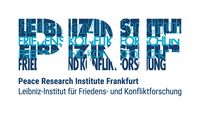 | | International ist das Institut längst unter seinem englischen Namen „Peace Research Institute Frankfurt“, kurz PRIF, bekannt. Nun führt es auch im Deutschen den Namen „PRIF – Leibniz-Institut für Friedens- und Konfliktforschung“. Wir tragen damit der zunehmenden Internationalisierung des Instituts Rechnung. Internationally the institute has long been known as "Peace Research Institute Frankfurt", or PRIF for short. Now it also bears the name “PRIF - Leibniz Institute für Friedens- und Konfliktforschung” in German. The change of name is a response to the increasing internationalization of the institute. | |
| |  | | Am 19. und 21. September 2023 findet in Bogotá, Kolumbien, die internationale Konferenz zum Thema „Erinnerung als Ressource in der Konfliktbearbeitung: Die Rolle von Medien und Journalist*innen bei der Friedensförderung“ statt. Für PRIF nehmen Sophia Birchinger, Sabine Mannitz und Jonas Wolff teil. Jonas Wolff und Sabine Mannitz moderieren je ein Panel zu Storytelling und Erinnerungsarbeit. Die zweitägige Veranstaltung soll internationale Wissenschaftler*innen und Medienpraktiker*innen zusammenbringen, um die Rolle von Medien und Journalist*innen in Friedenskonsolidierungsprozessen nach Gewaltkonflikten und Verbrechen gegen die Menschlichkeit zu bewerten. On September 20 and 21, 2023, the international conference on “Memory as a Resource in Conflict Transformation: The role of media and journalists in peacebuilding” will be held in Bogotá, Colombia. For PRIF, Sophia Birchinger, Sabine Mannitz and Jonas Wolff will participate. Jonas Wolff and Sabine Mannitz will each moderate a panel on storytelling and memory work. The two-day event brings together international scholars and media practitioners with a view to assessing the role of media and journalists in peacebuilding processes after violent conflict and crimes against humanity. | |
| | 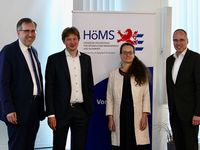 | | Mit der Forschungsstelle „Extremismusresilienz“ an der Hessischen Hochschule für öffentliches Management und Sicherheit richtet Hessen als erstes Bundesland eine dauerhafte Forschungsstelle für die Erforschung von Extremismus ein. Unter Leitung von Julian Junk wird dort untersucht, wie sich Menschen radikalisieren und wie politischem Extremismus in Organisationen wie der Polizei vorgebeugt werden kann. Julian Junk leitet, gemeinsam mit Hande Abay Gaspar, weiterhin die PRIF-Forschungsgruppe „Radikalisierung“. Eine Kooperationsvereinbarung zwischen PRIF und HöMS trägt zur Vernetzung in der Extremismusforschung bei. With the research unit “Extremism Resilience” at the Hessian University of Applied Sciences for Public Management and Security (HöMS), Hesse is the first German State to establish a permanent research unit for the study of extremism. Under the direction of Julian Junk, research is being conducted into how people become radicalized and how political extremism can be prevented in organizations such as the police. Julian Junk, together with Hande Abay Gaspar, continues to lead PRIF's Research Group on “Radicalization”. A cooperation agreement between PRIF and HöMS contributes to networking in extremism research. | |
| | 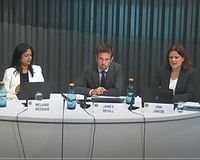 | | PRIF-Beitrag auf Biosicherheitskonferenz in GenfAm 4. und 5. Juli 2023 fand die „Biorisks, Biosecurity and Biological Disarmament Conference“ in Genf statt, die vom United Nations Institute for Disarmament Research (UNIDIR), dem United Nations Office for Disarmament Affairs (UNODA) und der World Health Organization (WHO) ausgerichtet wurde. Für das PRIF nahm Una Jakob teil, die am Institut die Forschungsgruppe „Bio- und Chemiewaffenkontrolle“ leitet. In Genf moderierte Una Jakob das Panel „Monitoring and Verification for the BWC“. Konferenz und Panel können auf Youtube gestreamt werden. PRIF Contribution at Biosecurity Conference in GenevaOn July 4-5, 2023, the Biorisks, Biosecurity and Biological Disarmament Conference was held in Geneva, hosted by the United Nations Institute for Disarmament Research (UNIDIR), the United Nations Office for Disarmament Affairs (UNODA), and the World Health Organization (WHO). For PRIF, Una Jakob participated, who leads the institute’s research group “Biological and Chemical Weapons Control”. In Geneva she moderated the panel “Monitoring and Verification for the BWC”. Conference and panel can be streamed on Youtube. | |
| | 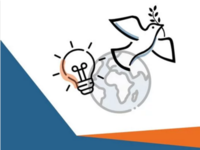 | | Aktuell beherrscht die Berichterstattung über den russischen Angriffskrieg gegen die Ukraine die Schlagzeilen. Doch nehmen gleichzeitig die Anzahl und Intensität anderer Gewaltkonflikte weltweit zu. Ziel des #PRIF@Schule_Preises 2024 ist es, diese vernachlässigten Konflikte wieder in den Fokus zu rücken. Das diesjährige Motto lautet „Vergessene (?) Konflikte weltweit“. Schulklassen und Schüler*innen der Klassen 9 bis 13 an hessischen Schulen sind eingeladen, sich mit kreativen und innovativen Projekten zu bewerben. Die Ausschreibung startet zu Beginn des Schuljahrs 2023/24. Currently, news coverage of Russia's war of aggression against Ukraine dominates the headlines. At the same time, the number and intensity of other violent conflicts around the world are increasing. The aim of #PRIF@School_Award 2024 is to bring these neglected conflicts back into focus. This year's motto is “Forgotten (?) Conflicts Worldwide”. School classes and students in grades 9 to 13 at Hessian schools are invited to apply with creative and innovative projects. The call for entries will start at the beginning of the 2023/24 school year. | |
| | 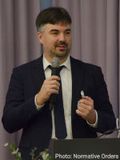 | | Daniel Lambach hat den Preis für den besten Artikel in der „Review of International Studies“ der „British International Studies Association“ erhalten. In dem prämierten Beitrag „Space, scale, and global politics: Towards a critical approach to space in International Relations“ befasst sich Daniel Lambach mit der Bedeutung des Raumes für die Internationalen Beziehungen. Mit der Verleihung des „Best Article in the Review of International Studies Prize“ würdigt der redaktionelle Beirat der Review of International Studies einmal im Jahr den besten Beitrag der vorhergegangenen Jahresausgabe. Daniel Lambach has received the “Best Article in the Review of International Studies Prize” from the British International Studies Association. In his award-winning article, “Space, scale, and global politics: Towards a critical approach to space in International Relations” Daniel Lambach addresses the significance of space for International Relations. With the award “Best Article in the Review of International Studies Prize”, the editorial advisory board of the Review of International Studies honors once a year the best contribution of the previous year's issue. | |
| |  | | Erinnerung an koloniale Gewalt in NamibiaNúrel Bahí Reitz untersucht während eines dreimonatigen Forschungsaufenthaltes in Namibia, wie an den Völkermord erinnert wird, der in der deutschen Kolonialzeit an Herero und Nama begangen wurde. Von August bis Oktober 2023 nimmt sie in Windhuk, Swakopmund und ländlichen Regionen an Gedenkveranstaltungen teil, zudem besucht sie relevante historische Orte, Denkmäler und Museen. Die Feldforschung erfolgt im Kontext des Regionalen Forschungszentrums „Transformations of Political Violence“ (TraCe) und trägt zugleich zur PRIF-Forschung für den Leibniz Forschungsverbund „Wert der Vergangenheit“ bei. Memories of Colonial Violence in NamibiaNúrel Bahí Reitz is spending three months in Namibia researching memories of the genocide committed against the Herero and Nama people during the German colonial period. From August to October 2023, she will participate in commemorative events in Windhoek, Swakopmund and rural areas as well as visit relevant historical sites, monuments and museums. Her field research will take place in the context of TraCe, the Regional Research Center on Transformations of Political Violence, and also contributes to PRIF research for the Leibniz Research Network “Value of the Past”. | |
| | 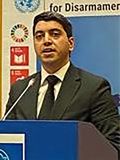 | | Besuche von UN-Konferenzen in Wien und GenfAlmuntaser Albalawi hat im August 2023 an einer Studienreise zum Sitz der Vereinten Nationen in Wien teilgenommen. Als Jugendstipendiat des Leaders2Future-Programms des UN-Büros für Abrüstungsfragen (UNODA) besuchte er dort die Sitzungen des Vorbereitungsausschusses für den Atomwaffensperrvertrag (NPT). In einer Nebenveranstaltung präsentierte er die Empfehlungen der Jugendvertreter*innen zur Stärkung des Multilateralismus in der Abrüstung. Zusammen mit Una Jakob nahm er außerdem an der Arbeitsgruppe zur Stärkung des Übereinkommens zu Biologischen Waffen teil, die vom 7. bis 18. August in Genf zu ihrer zweiten Sitzung zusammentrat. Visits to UN Conferences in Vienna and GenevaAlmuntaser Albalawi participated in a study tour to the United Nations Headquarters in Vienna in August 2023. As a youth fellow of the Leaders2Future program of the UN Office for Disarmament Affairs (UNODA), he attended the sessions of the Nuclear Non-Proliferation Treaty (NPT) Preparatory Committee there. In a side event, he presented the recommendations of the youth representatives to strengthen multilateralism in disarmament. Together with Una Jakob, he also participated in the Working Group on Strengthening the Biological Weapons Convention, which held its second meeting in Geneva from August 7 to 18. | |
| |  | | Neuer wissenschaftlicher Mitarbeiter bei RadiGameConstantin Winkler ist seit Juli 2023 wissenschaftlicher Mitarbeiter im Projekt RadiGaMe. Zudem arbeitet er an seiner Dissertation über Antisemitismus in den Communities digitaler Spiele. Constantin Winkler hat Sozialwissenschaften an der Humboldt-Universität zu Berlin studiert. Zuletzt war er Projektleiter im Bereich Antisemitismus am Internationalen Institut für Bildung, Sozial- und Antisemitismusforschung (IIBSA) in Berlin. New Researcher at RadiGameSince July 2023 Constantin Winkler is a researcher in the RadiGaMe project. He is also working on a dissertation on anti-semitism in communities of digital games. Constantin Winkler studied social sciences at the Humboldt University in Berlin. Most recently, he was a project manager in the field of anti-semitism at the International Institute for Research on Education, Social and Anti-Semitism (IIBSA) in Berlin. | |
| |  | | PrEval erhält Unterstützung im WissenstransferSeit August 2023 unterstützt Franziska Heil das Projekt PrEval Zukunftswerkstätten, das sich mit der Qualitätssicherung in der Extremismusprävention, Demokratieförderung und politischen Bildung in Deutschland auseinandersetzt. Als Referentin für Wissenstransfer koordiniert sie den Austausch zwischen Wissenschaft, Öffentlichkeit und Fachpraxis. Franziska Heil hat Kriminologie und Gewaltforschung an der Universität Regensburg studiert und sich mit den unterschiedlichsten Fragen rund um das Thema Radikalisierung beschäftigt. PrEval Receives Support in Knowledge TransferSince August 2023 Franziska Heil has been supporting the PrEval dialogue formats, which focus on quality assurance in extremism prevention, democracy promotion, and political education in Germany. As a knowledge transfer officer, she coordinates the exchange between academia, the public, and professional practice. Franziska Heil studied criminology and violence research at the University of Regensburg and has worked on a wide range of issues related to radicalization. | |
| |  | | Neue Mitarbeiterin bei RADISSeit August 2023 ist Shaimaa Abdellah als wissenschaftliche Mitarbeiterin im Transfervorhaben RADIS tätig. Sie wird die Vernetzung der Forschungsprojekte zur Analyse gesellschaftlicher Ursachen und Auswirkungen des radikalen Islam in Deutschland und Europa unterstützen. Shaimaa Abdellah hat den Masterstudiengang „Global Communication: Politics and Society“ der Universität Erfurt absolviert. Zudem besitzt sie akademische und berufliche Expertise in den Bereichen Radikalisierung, politische Kommunikation und Bildung. New Colleague at RADISIn August 2023 Shaimaa Abdellah joined the RADIS transfer project as a researcher. Shaimaa Abdellah will support the networking of the research projects analyzing societal causes and effects of radical Islam in Germany and Europe. Shaimaa Abdellah graduated from the master's program “Global Communication: Politics and Society” at the University of Erfurt. Additionally, she has academic and professional expertise in the fields of radicalization, political communication and education. | |
| |  | | CNTR erhält UnterstützungSeit August 2023 unterstützen Liska Suckau und Thomas Reinhold das Cluster Natur- und Technikwissenschaftliche Rüstungskontrollforschung (CNTR). Beide arbeiten in der CNTR-Forschungsgruppe „Emerging Disruptive Technologies“ mit. Liska Suckau hat Maschinenbau, Politikwissenschaft sowie War and Peace Studies studiert. Sie forscht zu den Gefahren und Möglichkeiten von Emerging Technologies und deren Implikationen für Sicherheitspolitik und Strategie. Thomas Reinhold ist wissenschaftlicher Mitarbeiter am PRIF und promoviert am Lehrstuhl Wissenschaft und Technik für Frieden und Sicherheit (PEASEC) der TU Darmstadt. Er forscht zu Computersystemen und ihren Auswirkungen im Kontext von Rüstungskontrolle und Völkerrecht. CNTR Receives SupportSince August 2023, Liska Suckau and Thomas Reinhold are supporting the Cluster for Natural and Technical Science Arms Control Research (CNTR). Both join the CNTR research group “Emerging Disruptive Technologies”.Liska Suckau studied mechanical engineering, political science, as well as war and peace studies. She conducts research on the risks and chances of emerging technologies and their implications for security policy and strategy. Thomas Reinhold is PRIF research associate as well as doctoral student at the Department of Science as well and Technology for Peace and Security (PEASEC) at the TU Darmstadt. He conducts research on computer systems and their implications in the context of arms control and international law. | |
| |  | | Seit 25. August 2023 ist Anindya Sekhar Purakayastha Gastprofessor am PRIF sowie Fellow des Leibniz Forschungsverbundes „Wert der Vergangenheit“. Er ist Professor für Literary Studies am Fachbereich Anglistik der Kazi Nazrul University sowie am Institute of Language Studies and Research (ILSR) in Kalkutta, Indien. Während seines einmonatigen Aufenthalts forscht er zu seinem Leibniz Fellowship Projekt „Fraternal Enmity: Violence as Popular Sovereignty and India’s Battle with the Past” zu politischer Gewalt in Indien. Since August 25, 2023, Anindya Sekhar Purakayastha is a Visiting Professor at PRIF as well as Fellow of the Leibniz Research Network “Value of the Past”. He is Professor of Literary Studies in the Department of English at Kazi Nazrul University and the Institute of Language Studies and Research (ILSR) in Kolkata, India. During his one-month stay, he will conduct research on political violence in India on his Leibniz Fellowship project “Fraternal Enmity: Violence as Popular Sovereignty and India’s Battle with the Past”. | |
| | 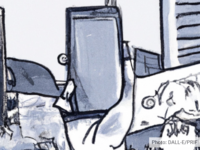 | | Bedeutet die Überwindung physischer Barrieren gleichzeitig mehr Inklusion? Wo liegen Risiken und ethische Bedenken in Kontexten sozialer Ungleichheit? Das öffentliche Dialogpanel „ICT4Peace“ (ICT steht für Information and Communication Technology) verbindet Perspektiven aus Wissenschaft und Praxis und findet am 21. September 2023 im Rahmen der Konferenz Science · Peace · Security ‘23 in Darmstadt statt. Das Panel, das in englischer Sprache diskutiert, wird per Livestream auf YouTube übertragen. Does overcoming physical barriers automatically mean more inclusion? What are ethical concerns in contexts of social inequality? The public dialogue panel “ICT4Peace” (ICT stands for Information and Communication Technology) connects perspectives from science and practice and takes place on September 21, 2023 as part of the Science · Peace · Security ‘23 conference in Darmstadt. The panel, which will be held in English, will be livestreamed on YouTube. Kommende Veranstaltungen: - Im Osten nichts Neues? Perspektiven der Kriegsforschung auf den Ukraine-Krieg, mit Regine Schwab, 13. September 2023.
- Imagining Peace in the Long Nineteenth Century (1789–1914), International Conference with Martti Koskenniemi, Raphaël Cahen and Hendrik Simon, 15. September 2023.
- Krisenzeiten, radikale Zeiten? – Neue Formen der Radikalisierung, Crisis Talk mit Julian Junk, 19. September 2023.
- Erinnerung als Mittel der Konfliktbearbeitung, Internationale Konferenz zur Rolle von Medien und Journalist*innen in Kolumbien, mit Sabine Mannitz, Jonas Wolff und Sophia Birchinger, 19. bis 21. September 2023
- Science Peace Security: Technology and the Transformation of Political Violence, Konferenz und TraCe-Dialogpanel, mit Kristoffer Burck, Anna-Katharina Ferl, Daniel Lambach und Regine Schwab u. a., 20. bis 21. September 2023.
- Jahreskonferenz 2023, Dealing with Autocracies in a Fragmented World, 12. bis 13. Oktober 2023.
- The Rooster House: My Ukrainian Family Story, A Memoir, Lesung und Diskussion (Englisch) mit der Autorin Victoria Belim moderiert von Jonas J. Driedger, 19. Oktober 2023.
| |
| | 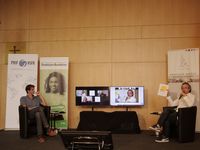 | | Livestreams zum Nachhören und -sehenDie folgenden Veranstaltungen sind weiterhin online abrufbar: Über unseren Youtube-Kanal sind viele Online-Talks frei verfügbar. | |
| |  | | Gespräch mit Claudia Baumgart-Ochse und Sascha Hach zum Friedensgutachten 2023 und zu einer zeitgemäßen Rüstungskontrollpolitik in der neuen Folge unseres Podcasts PRIF Talk.
Talk with Claudia Baumgart-Ochse and Sascha Hach about the Peace Report 2023 and a contemporary arms control policy in the new episode of our podcast PRIF Talk. | |
| | 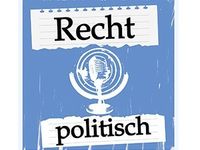 | | Welche Auswirkungen haben KI und Neue Technologien auf die Kriegsführung? Was heißt das für die Rüstungskontrolle? Elisabeth Hoffberger-Pippan spricht mit Ralph Janik im Podcast „Recht politisch“. What impact do AI and new technologies have on warfare? What can arms control look like today? Elisabeth Hoffberger-Pippan talks with Ralph Janik in the podcast “Recht politisch”. | |
| | 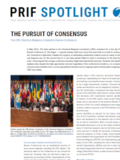 | | Im Mai 2023 kamen 193 Vertragsstaaten des Chemiewaffenkonvention (CWC) zu einer Überprüfungskonferenz in Den Haag zusammen. Zum zweiten Mal in Folge gelang es den Vertragsstaaten nicht, einen Konsens über das Abschlussdokument zu erzielen. Das PRIF Spotlight von Almuntaser Albalawi und Kristoffer Burck erklärt, warum dieses Ergebnis trotz der hohen Opportunitätskosten und ungeachtet der Dauer der Konferenz unvermeidlich war.
In May 2023, 193 state parties to the Chemical Weapons Convention (CWC) convened for a Review Conference in The Hague. For the second time in a row state parties failed to reach a consensus on the final document. The PRIF Spotlight by Almuntaser Albalawi and Kristoffer Burck explains why, despite the high opportunity cost and regardless of the conference’s duration, a no-consensus outcome was inevitable. Weitere Neuerscheinungen (Auswahl): - Kuhn, Frank (2023): Das Raketenabwehrsystem Arrow 3: Eine fragliche Beschaffung, PRIF Blog, 25. August 2023.
- Wolff, Jonas (2023): Debating Foreign Interference in a Multipolar World: Is the EU Becoming Illiberal?, PRIF Blog, 24. August 2023.
- Hoffberger-Pippan, Elisabeth; de Vries, Barry (2023): Chemical Attacks under the Convention against Torture: A New Possible Avenue?, PRIF Blog, 21. August 2023.
- Krell, Gert (2023): Shitstorms gegen eine Nahost-Expertin: Über einseitige und polemische Einwände gegen ein Interview zum israelisch-palästinensischen Konflikt, PRIF Blog, 31. Juli 2023.
- Driedger, Jonas J. (2023): “Russian Self-Defense”? Fact-Checking Arguments on the Russo-Ukrainian War by John J. Mearsheimer and Others, PRIF Blog, 26. Juli 2023.
- Gromes, Thorsten (2023): Wie verlässlich sind Daten zu Todesopfern in bewaffneten Konflikten?, PRIF Blog, 27. Juli 2023.
- Tsarfin, Lion (2023): Mutiger Einsatz für die Menschlichkeit. Die Verleihung des Hessischen Friedenspreises 2022 an Ilwad Elman., PRIF Spotlight 6/2023, Frankfurt/M.
- Flamm, Patrick; Kroll, Stefan (2023): Nachhaltig wehrhaft?, PRIF Blog, 24. Juli 2023.
- Abb, Pascal (2023): Germany’s New China Strategy: A Defensive Shift, PRIF Blog, 19. Juli 2023.
- Wisotzki, Simone (2023): Militärisch nützlich, moralisch verwerflich? Die Debatten um die US-Lieferungen von Streumunition an die Ukraine, PRIF Blog, 14. Juli 2023.
- Ben Aharon, Eldad: Outlook on German-Israeli Relations: German Staatsraison and Netanyahu‘s Coalition Contentious ‚Judicial Reform‘, PRIF Spotlight 6/2023, Frankfurt/M.
- Dembinski, Matthias (2023): Zum Design militärischer Interventionen für Frieden und humanitären Schutz, PRIF Report 5/2023, Frankfurt/M.
Auf unserem PRIF Blog erscheint fortlaufend eine große Zahl neuer Beiträge. // A large number of new posts appear on PRIF Blog on an ongoing basis. | |
| | 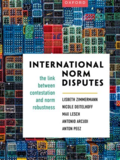 | | Internationale Normen und die internationale Ordnung selbst sind ständigen Herausforderungen ausgesetzt. In der neu erschienenen Monographie „International Norm Disputes: The Link between Contestation and Norm Robustness“ erforschen Lisbeth Zimmermann, Nicole Deitelhoff, Max Lesch, Antonio Arcudi und Anton Peez im Rahmen von vier aktuellen Fallstudien wie sich der Streit um internationale Normen auf ihre Geltung auswirkt.
International norms, institutions, and the international order itself are increasingly under challenge In their newly released monograph “International Norm Disputes: The Link between Contestation and Norm Robustness” Lisbeth Zimmermann, Nicole Deitelhoff, Max Lesch, Antonio Arcudi, and Anton Peez explore how the dispute over international norms affects their validity. The book compares four contemporary cases of contested norms. Weitere Neuerscheinungen (Auswahl) - Simon, Hendrik (2023): A Century of Anarchy? War, Normativity, and the Birth of Modern International Order, Oxford: Oxford University Press.
- Harth, Lukas; Kriener, Florian; Wolff, Jonas (2023): The EU Response to Foreign Interference. Legal Issues and Political Risks, in: Heidelberg Journal of International Law (HJIL)/Zeitschrift für ausländisches öffentliches Recht und Völkerrecht (ZaöRV), 83(2), 197-207, DOI: 10.17104/0044-2348-2023-2-197.
- Müller, Melanie; Hoffberger-Pippan, Elisabeth (2023): Südafrikas Außenpolitik: Kritik an der multilateralen Ordnung, in: Megatrends Afrika, DOI: 10.18449/2023MTA-KA06.
- Mannitz, Sabine; Fuhrmann, Larissa-Diana (2023): Representations of Political Violence in Museological Spaces. Decolonial Strategies, Contested Memory and Transformative Potential, boasblogs Contested Knowledge, 19. Juli 2023.
- Burck, Kristoffer; de Vries, Barry (2023): Umsetzung der Normen gegen chemische und biologische Waffen im deutschen Kontext, CBWNet Working Paper No. 6, July 2023.
- Gromes, Thorsten (2023): Reporting of conflict fatalities in the UCDP Georeferenced Event Dataset: insights from Kosovo, in: Zeitschrift für Vergleichende Politikwissenschaft, DOI: 10.1007/s12286-023-00573-9.
- Ferl, Anna-Katharina (2023): Imagining Meaningful Human Control: Autonomous Weapons and the (De-)Legitimisation of Future Warfare, in: Global Society, DOI: 10.1080/13600826.2023.2233004.
- Schwab, Regine (2023): The weaponization of civilian infrastructure, CPD Policy Blog, 05. Juli 2023.
- Wolff, Jonas (2023): Conflictividad, (des)confianza y pluralismo jurídico en la región andina, in: Andares: Revista en Derechos Humanos y de la Naturaleza, 2(3), 26-36, DOI: 10.32719/29536782.2023.1.3.
Zur Liste der aktuellen Publikationen // To the latest publications | |
| | Weitere Medienbeiträge sind auf dem PRIF-Presseportal zu finden. // Further media contributions can be found on PRIF's press portal. - Vier Milliarden für Raketen-Abwehr: Deutschland kauft neues Waffensystem in Israel, Radiointerview mit Frank Kuhn, WDR 5, 17. August 2023.
- Niger - Wie Deutschland Einfluss nehmen kann, Radiointerview mit Simone Schnabel, Deutschlandfunk Nova, 14. August 2023.
- Wie der Putsch in Niger Europas Sicherheit bedroht, Podcast mit Antonia Witt, FAZ, 12. August 2023.
- As economy stumbles over judicial push, Israel banks on an energy boom, Artikel mit Eldad Ben Aharon, Washington Post, 10. August 2023.
- „Die AfD als bloße Protestpartei darzustellen, verharmlost die Herausforderung“, Interview mit Julian Junk, FAZ, 31. Juli 2023.
- Konfliktforscher über Sanktionen: „Mehr für eigene Werte werben“, Interview mit Christopher Daase, Frankfurter Rundschau, 18. Juli 2023.
- Was passiert, wenn das Getreideabkommen ausläuft?, Radiointerview mit Mikhail Polianskii, hr iNFO, 17. Juli 2023.
- Expertin: Ukraine-Krieg könnte sich noch Jahre hinziehen, Interview mit Nicole Deitelhoff, mdr, 09. Juli 2023.
- Streubomben aus Washington an Kiew: Rechtlich und moralisch in Ordnung?, Radiointerview mit Simone Wisotzki, Deutschlandfunk Kultur, 07. Juli 2023.
- Nach dem Kalten Krieg: Wie sich die NATO mit "Out of area"-Einsätzen neu erfunden hat, Podcast mit Matthias Dembinski, ntv, 06. Juli 2023.
| |
|
|
Sie möchten den Newsletter in Zukunft nicht mehr empfangen? Dann klicken Sie bitte hier.
To unsubscribe from the newsletter please click here. |
|
|






















